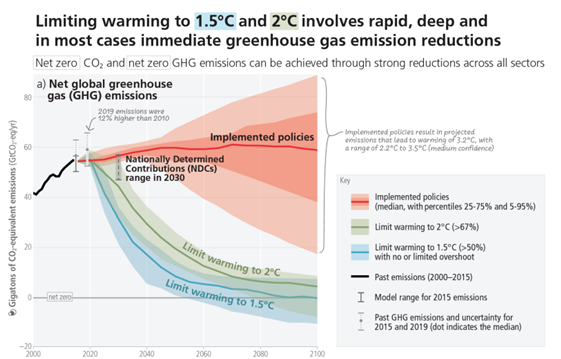The Intergovernmental Panel on Climate Change (IPCC) released last week week the final part of the 6th assessment cycle (AR6) and the most comprehensive assessment on climate change so far: the AR6 Synthesis Report.
Despite being a scientific paper, it is signed off by countries so as to ensure that governments acknowledge its findings as authoritative advice on which to base their actions. It is important to bear in mind that the Synthesis Report concludes this eight year-cycle, building on the previous AR6 underlying reports which were published between 2018 and 2022.
The main take-aways
- Humans have “unequivocally caused global warming” – we are responsible for the 1.1°C of temperature increase evidenced since the start of the industrial era.
- Climate change has reduced food security and affected water security, hindering efforts to meet the Sustainable Development Goals.
- There is a rapidly closing window of opportunity to secure a liveable and sustainable future for all – but it is still possible!
What to expect as regards global warming?
- Policies in place by the end of 2021 would likely cause temperatures to exceed 1.5°C this century and reach around 3.2°C by 2100.
- In many parts of the world, humans and ecosystems will be unable to adapt to this amount of warming, with losses and damages escalating and disproportionately impacting the most vulnerable.
- Limiting human-caused global warming requires net zero CO2 emissions.
- Slowing down global warming requires “deep and rapid, and, in most cases, immediate greenhouse gas emissions reductions in all sectors this decade”, nevertheless, these efforts will not be felt for some time.
- Until the time of reaching net-zero CO2 emissions, global warming will continue to increase in the near term (2021-2040) due to cumulative carbon emissions, and global warming is more likely than not to reach 1.5°C even under a very low greenhouse gas emission scenario.
- The level of greenhouse gas emission reductions this 20’s decade largely determines whether warming can be limited to 1.5°C or 2°C: the decisions made now will project their impact for the rest of the century.
If we were to retain only one of all the tables and figures of the Synthesis Report, this should be the one:

Source: Expected warming in 2100 considering policies implemented by the end of 2020 (red), compared with emissions cuts needed to limit warming to 1.5°C (blue) or 2°C (green). Source: IPCC (2023) SPM.5
The good news is that…
- Feasible, effective, and low-cost options for mitigation and adaptation (e.g., wind and solar power) are already available, despite differences across systems and regions, and deliver co-benefits for air quality, human health and nature.
- Natural Climate Solutions, including the conservation of between 30% to 50% of the Earth’s land, freshwater and ocean areas, can protect biodiversity and carbon sinks such as forests and wetlands, but also ensure ecosystem services related to food and health.
And we must remember…
- Accelerated and equitable action in mitigating and adapting to climate change impacts is critical to achieving the Sustainable Development Goals: we must prioritize equity, climate justice, social justice, inclusion and just transition processes.
- Effective climate action is enabled by political commitment, well-aligned multilevel governance, institutional frameworks, laws, policies and strategies, and by enhanced access to finance and technology.
- Regulatory and economic instruments can support deep emissions reductions and climate adaptation and resilience if scaled up and applied widely.
What follows?
- In 9 months, leaders will gather in COP28 for the first global stocktake of the Paris Agreement, on the run-up to the next cycle of new national climate plans (due in 2025), with a “full scientific picture” on climate change.
- In the meantime, the IPCC’s 7th assessment cycle (AR7) is to begin in July 2023 and will last between five to seven years, with the first full assessment reports of AR7 likely not to be expected before 2027 or 2028.
Summing-up…
- Climate change is perhaps the main challenge of our time and it interconnects with multiple crisis humanity and the world are facing, including nature loss, water scarcity, food and health (in)security, growing inequalities.
- Cross-cutting issues require a common approach and we have a 2030 Agenda and its Sustainable Development Goals that draw a clear shared roadmap to address all these challenges.
- We should seize the momentum building on this AR6 Synthesis Report, together with the new UN Global Biodiversity Framework, the High Seas Treaty and the outcomes of the Water Conference (the first meeting on water in nearly fifty years held this week in the UN’s headquarters in NYC) to drive sustainable development in a just, equitable and inclusive way, leaving no one behind.
- And we must remember: driving sustainability requires innovative finance mechanisms capable of attracting the investment needed to boost these efforts.
The Synthesis Report says it bluntly: it’s in our capacity to succeed.
The ultimate questions are: Do we want do make the so much needed “Quantum Leap in Climate Action”? And will we be able to do it fast enough?
Have a great and impactful week!
Angela Lucas
Advisor at the Center for Responsible Business & Leadership
This article refers to edition #183 of the "Have a Great and Impactful Week" Newsletter and covers SDG 16.
Subscribe here to receive the weekly newsletter.